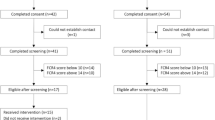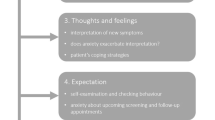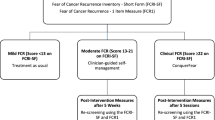Abstract
Purpose
Despite strong demand from breast cancer survivors, there is a dearth of flexibly delivered, accessible psychological interventions addressing fear of cancer recurrence (FCR). This study aimed to explore patients’ and clinicians’ perspectives concerning the experience, utility and barriers to a novel clinician-led FCR intervention (CIFeR).
Methods
Twenty female participants (mean age, 59.8, SD = 11.43), diagnosed with early-stage breast cancer (mean years since diagnosis = 2.8, SD = 1.37 years) participated in telephone interviews, and their five oncologists completed a semi-structured electronic survey. Thematic qualitative analyses were performed on interview transcripts and survey responses.
Results
Findings indicated both patients and clinicians were positive about CIFeR with perceived cognitive, behavioural and emotional benefits of CIFeR most pronounced for patients with clinically significant FCR. All patients, however, found that receiving CIFeR (especially the tailored prognostic information) from their oncologists with whom they had a long-standing relationship added a much-needed human element to addressing FCR. Similarly, clinicians valued CIFeR as a clear and consistent way to address unmet needs around FCR, with some barriers around time, language and cultural issues noted.
Conclusion
Overall, all participants perceived CIFeR as strongly beneficial in reducing FCR and related worries, thus warranting further evaluation of its utility in clinical practice.
Similar content being viewed by others
Data availability
Data is available in de-identified form as an Excel spreadsheet on OSF under the link: https://osf.io/s9djt/files/.
Code availability
N/A.
Notes
One clinician participant did not specify their exact age or years in oncology, replying they were in their “late 40 s” and spent “15 to 20 years” in the profession. In order to proceed with analyses, the missing data were substituted with the mean values for age (47 years, between 45 and 50 years) and years of experience (17 years, between 15 and 20 years) within the boundaries specified by the participant, per Salkind [16]. No other missing data was recorded.
References
Simard S, Thewes B, Humphris G, Dixon M, Hayden C, Mireskandari S, Ozakinci G (2013) Fear of cancer recurrence in adult cancer survivors: a systematic review of quantitative studies. J Cancer Surviv 7(3):300–322. https://doi.org/10.1007/s11764-013-0272-z
Lebel S, Ozakinci G, Humphris G et al (2016) From normal response to clinical problem: definition and clinical features of fear of cancer recurrence. Support Care Cancer 24(8):3265–3268. https://doi.org/10.1007/s00520-016-3272-5
Thewes B, Butow P, Bell ML et al (2012) Fear of cancer recurrence in young women with a history of early-stage breast cancer: a cross-sectional study of prevalence and association with health behaviours. Support Care Cancer 20:2651–2659. https://doi.org/10.1007/s00520-011-1371-x
Butow P, Sharpe L, Thewes B et al (2018) Fear of cancer recurrence: a practical guide for clinicians. Oncology (Williston Park) 32(1):32-38. Retrieved from https://pubmed.ncbi.nlm.nih.gov/29447419/
Lebel S et al (2017) Current state and future prospects of research on fear of cancer recurrence. Psychooncology 26(4):424–427. https://doi.org/10.1002/pon.4103
Fardell JE et al (2016) Fear of cancer recurrence: a theoretical review and novel cognitive processing formulation. J Cancer Surviv 10(4):663–673. https://doi.org/10.1007/s11764-015-0512-5
Tauber NM, O’Toole MS, Dinkel A et al (2019) Effect of psychological intervention on fear of cancer recurrence: a systematic review and meta-analysis. J Clin Oncol 37:2899–2915. https://doi.org/10.1200/JCO.19.00572
Cessna Palas JM, Hyland KA, Nelson AM et al (2020) An examination of the relationship of patient modifiable and non-modifiable characteristics with fear of cancer recurrence among colorectal cancer survivors. Supportive Care Cancer. https://doi.org/10.1007/s00520-020-05552-4
Liu JJ, Butow P, Beith J (2019) Systematic review of interventions by non-mental health specialists for managing fear of cancer recurrence in adult cancer survivors. Support Care Cancer 8:1–3. https://doi.org/10.1007/s00520-019-04979-8
Lynch FA, Katona L, Jefford M, Smith AB, Shaw J, Dhillon HM, Ellen S, Phipps-Nelson J, Lai-Kwon J, Milne D, Russell L (2020) Feasibility and acceptability of fear-less: a stepped-care program to manage fear of cancer recurrence in people with metastatic melanoma. J Clin Med 9(9):2969. https://doi.org/10.3390/jcm9092969
Krebber AM, Leemans CR, de Bree R, van Straten A, Smit F, Smit EF, Becker A, Eeckhout GM, Beekman AT, Cuijpers P, Verdonck-de Leeuw IM (2012) Stepped care targeting psychological distress in head and neck and lung cancer patients: a randomized clinical trial. BMC Cancer 12(1):1–8. https://doi.org/10.1186/1471-2407-12-173
Hauffman A, Alfonsson S, Bill-Axelson A, Bergkvist L, Forslund M, Mattsson S, von Essen L, Nygren P, Igelström H, Johansson B (2020) Cocreated internet-based stepped care for individuals with cancer and concurrent symptoms of anxiety and depression: results from the U-CARE AdultCan randomized controlled trial. Psychooncology. https://doi.org/10.1002/pon.5489
Liu J et al (2020) CIFeR: A novel clinician-lead intervention to address fear of cancer recurrence (FCR) in breast cancer survivors. J Clin Oncol 38(15):12115–12115. https://doi.org/10.1200/JCO.2020.38.15_suppl.12115
Liu J, Butow P, Bui KT, Serafimovska A, Costa DS, Kiely BE, Hui MN, Goodwin A, McNeil CM, Beith JM (2021) Novel clinician-lead intervention to address fear of cancer recurrence in breast cancer survivors. JCO Oncology Practice OP-20 https://doi.org/10.1200/OP.20.00799
Simard S, Savard J (2009) Fear of cancer recurrence inventory: development and initial validation of a multidimensional measure of fear of cancer recurrence. Supportive Care Cancer 17:241–251. https://doi.org/10.1007/s00520-008-0444-y
Salkind, N. J (2010). Encyclopedia of research design (Vols. 1–0). Thousand Oaks, CA: SAGE Publications, Inc. https://doi.org/10.4135/9781412961288
Braun V, Clarke V (2006) Using thematic analysis in psychology. Qual Res Psychol 3(2):77–101. https://doi.org/10.1191/1478088706qp063oa
Nowell LS, Norris JM, White DE, Moules NJ (2017) Thematic analysis: striving to meet the trustworthiness criteria. International journal of qualitative methods 28;16(1):1609406917733847. https://doi.org/10.1177/1609406917733847
Mitchell KA, Brassil KJ, Rodriguez SA, Tsai E, Fujimoto K, Krause KJ, Shay LA, Springer AE (2020) Operationalizing patient-centered cancer care: a systematic review and synthesis of the qualitative literature on cancer patients’ needs, values, and preferences. Psychooncology. https://doi.org/10.1002/pon.5500
Grassi L, Mezzich JE, Nanni MG, Riba MB, Sabato S, Caruso R (2017) A person-centred approach in medicine to reduce the psychosocial and existential burden of chronic and life-threatening medical illness. Int Rev Psychiatry 29(5):377–388. https://doi.org/10.1080/09540261.2017.1294558
Grassi L, Spiegel D, Riba M (2017) Advancing psychosocial care in cancer patients. F1000Res 6:2083. Published 2017 Dec 4. https://doi.org/10.12688/f1000research.11902.1https://www.ncbi.nlm.nih.gov/pmc/articles/PMC5717468/
Thewes B, Brebach R, Dzidowska M, Rhodes P, Sharpe L, Butow P (2014) Current approaches to managing fear of cancer recurrence; a descriptive survey of psychosocial and clinical health professionals. Psychooncology 23(4):390–396. https://doi.org/10.1002/pon.3423
Berrett-Abebe J, Cadet T, Vitello J, Maramaldi P (2018) Developing content for an interprofessional training on fear of cancer recurrence (FCR): key informant interviews of healthcare professionals, researchers and cancer survivors. J Psychosoc Oncol 36(3):259–273. https://doi.org/10.1080/07347332.2018.1443987
Schell SF, Luke DA, Schooley MW, Elliott MB, Herbers SH, Mueller NB, Bunger AC (2013) Public health program capacity for sustainability: a new framework. Implementation Sci 8:15. https://doi.org/10.1186/1748-5908-8-15
Acknowledgements
The research team would like to thank all participating patients, oncologists and research staff who contributed their time and insights.
Funding
The Avant Foundation and Sydney Breast Cancer Foundation funded this study.
Author information
Authors and Affiliations
Contributions
Jia Liu, Phyllis Butow and Jane Beith conceived and developed the study design. Material preparation, data collection and analyses were completed by Anastasia Serafimovska, Jia Liu and Jane Beith. Anastasia Serafimovska conducted all interviews, with Phyllis Butow also analysing qualitative findings. All authors commented on the first draft of the manuscript by Anastasia Serafimovska, and all authors contributed to and approved the manuscript in preparation for publication.
Corresponding author
Ethics declarations
Ethics approval
All phases of this study were conducted in line with the principles of the 1964 Helsinki Declaration. Ethical approval was gained on the 27th of September 2019 from Sydney Local Health District Human Research Ethics Committee (CRGH Zone) (Reference: HREC/18/CRGH/237) and University of Sydney Human Ethics committee prior to study commencement. All study phases (i.e. data collection, analysis and presentation) were conducted in adherence with these ethical standards around data protection, confidentiality and privacy.
Consent to participate and consent for publication
All participants provided fully informed consent to participate in this study and for their data to be published in aggregate (de-identified) format.
Conflict of interest
The authors declare no competing interests.
Additional information
Publisher's note
Springer Nature remains neutral with regard to jurisdictional claims in published maps and institutional affiliations.
This study was prospectively registered on the 2nd of October 2018 in the Australian New Zealand Clinical Trials Registry (ACTRN12618001615279).
Supplementary Information
Below is the link to the electronic supplementary material.
Rights and permissions
About this article
Cite this article
Serafimovska, A., Liu, J., Beith, J. et al. Patients’ and oncologists’ perspectives on a novel Clinician-led Fear of Cancer Recurrence (CIFeR) Intervention . Support Care Cancer 29, 7637–7646 (2021). https://doi.org/10.1007/s00520-021-06336-0
Received:
Accepted:
Published:
Issue Date:
DOI: https://doi.org/10.1007/s00520-021-06336-0




